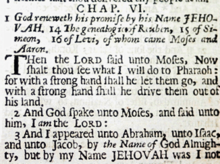
Back يهوه (اسم) Arabic Xehová AST Yehova AZ Jehova BS Jahvè (nom propi de Déu) Catalan Ià-huò-huà CDO Jehovah English Jehovo EO Jehová Spanish Jehoova ET

Geova è una latinizzazione della lingua ebraica, una vocalizzazione del tetragramma biblico (YHWH), il nome proprio del Dio d'Israele nella Bibbia ebraica[1] e uno dei sette nomi di Dio nell'ebraismo.
La vocalizzazione storica fu persa perché nel giudaismo del Secondo Tempio, tra il III e il II secolo a.C., venne evitata la pronuncia del Tetragramma, sostituita con Adonai ("Signore"). I punti vocalici ebraici di Adonai furono aggiunti al Tetragramma dai Masoreti e la forma risultante fu traslitterata intorno al XII secolo come Yehowah .[2] Le forme derivate Iehouah e Geova apparvero per la prima volta nel XVI secolo.
"Geova" è stato reso popolare nel mondo di lingua inglese da William Tyndale e altre traduzioni pionieristiche di protestanti inglesi come la Bibbia di Ginevra e la versione di Re Giacomo .[3] La Conferenza episcopale degli Stati Uniti afferma che per pronunciare il Tetragramma "è necessario introdurre vocali che alterano le forme scritte e parlate del nome", dando luogo a "Yahweh", "Yehwah" o "Geova".[4] Rimane anche in uso dai traduttori della Società Torre di Guardia (la quale pubblica la Traduzione del Nuovo Mondo) e appare nelle traduzioni ancora popolari dell'American Standard Version (1901) e della Young's Literal Translation (1862, 1899), ma non appare nelle traduzioni inglesi tradizionali, alcune delle quali usano Yahweh ma la maggior parte continua a usare "Signore" (anche se, in realtà, trattasi di titolo e non di nome proprio) per rappresentare lo stesso.[5][6]
- ^ Patrick Fairbairn (ed.), The Imperial Bible-Dictionary, Londra, 1886, Volume 1, p. 856. "Jehovah, on the other hand, the personality of the Supreme is more distinctly expressed. It is every where a proper name, denoting the personal God and him only; whereas Elohim partakes more of the character of a common noun, denoting usually, indeed, but not necessarily nor uniformly, the Supreme. Elohim may be grammatically defined by the article, or by having a suffix attached to it, or by being in construction with a following noun. The Hebrew may say the Elohim, the true God, in opposition to all false gods; but he never says the Jehovah, for Jehovah is the name of the true God only. He says again and again my God; but never my Jehovah, for when he says my God, he means Jehovah. He speaks of the God of Israel, but never of the Jehovah of Israel, for there is no other Jehovah. He speaks of the living God, but never of the living Jehovah, for he cannot conceive of Jehovah as other than living. It is obvious, therefore, that the name Elohim is the name of more general import, seeing that it admits of definition and limitation in these various ways; whereas Jehovah is the more specific and personal name, altogether incapable of limitation."
- ^ Schaff, Philip -Yahweh The New Schaff-Herzog Encyclopedia of Religious Knowledge Volume XII, Paper Book House, Grand Rapids, Michigan, 1950, page 480.
- ^ In the 7th paragraph of Introduction to the Old Testament of the New English Bible, Sir Godfry Driver wrote, "The early translators generally substituted 'Lord' for [YHWH]. [...] The Reformers preferred Jehovah, which first appeared as Iehouah in 1530 A.D., in Tyndale's translation of the Pentateuch (Exodus 6.3), from which it passed into other Protestant Bibles."
- ^ (EN) The Name of God in the Liturgy, su usccb.org, United States Conference of Catholic Bishops, 2008.
- ^ English Standard Version Translation Oversight Committee Preface to the English Standard Version Quote: "When the vowels of the word adonai are placed with the consonants of YHWH, this results in the familiar word Jehovah that was used in some earlier English Bible translations. As is common among English translations today, the ESV usually renders the personal name of God (YHWH) with the word Lord (printed in small capitals)."
- ^ Bruce M. Metzger for the New Revised Standard Version Committee. To the Reader, p. 5